Annual Report 23/24
Introduction
Welcome to the Health Innovation Network (HIN) South London’s 23/24 Annual Report.
Watch our introductory video to hear from our Chief Executive Rishi Das-Gupta, Chair Hitesh Thakrar and our Lived Experience Partners Faith Smith and Aurora Todisco.
Read on to find out more about the projects we’ve worked on over the past year.
1Accessing innovations
Ensuring south London benefits from national innovation priorities which address health inequalities.
The Health Innovation Network (HIN) South London plays a pivotal role in transforming healthcare locally by ensuring that national innovation effectively addresses health inequalities and regional priorities. As the conduit between healthcare organisations, academic institutions, local communities, and industry partners, our initiatives focus on advancing healthcare through innovative solutions that meet the diverse needs of the population. By emphasising the adoption of breakthrough technologies and evidence-based practices, we facilitate
improvements in areas such as diabetes care, mental health, and healthy ageing, directly targeting the disparities that exist within these fields. Through collaboration and leadership, the HIN ensures that innovations reach those who need them most, thereby enhancing access to quality care and promoting health equity across south London. This strategic approach has so far brought in £1.5m in additional investment to south London, not only addressing current health challenges but also building a resilient healthcare infrastructure for the future.
The Innovation for Healthcare Inequalities Programme (InHIP) progressed in 23/24, with three discrete south London projects improving access to NICE-approved innovations for under-served populations:
- Access to respiratory diagnostic testing has been improved in deprived areas of Merton, Bromley and Sutton. Testing started in Q4, with roughly 225 and 200 patients expected to benefit in south east and south west London respectively;
- A test for preterm pre-eclampsia was introduced in Croydon, ensuring access for women in a borough with some of the most deprived populations and most prevalent risk factors. Up to two women a day in Croydon are expected to benefit from the technology, which is expected to match or exceed the combined total for the rest of south west London;
- A pharmacist-led Primary Care Network (PCN) based lipid management clinic was launched in Bexley, aiming to address identified inequalities in treatment optimisation in some age and ethnicity groups. The clinic has already seen 70 patients and is expected to see a further 80 through 2024.
Implementation support of the MedTech Funding Mandate (MTFM) products also continued. Highlights this year included the introduction of 11 new portable digital chest drain systems and investment in Sickle Cell services; six Spectra Optia apheresis devices worth £300,000 were ordered and associated funding agreed to improve care for 300 patients.
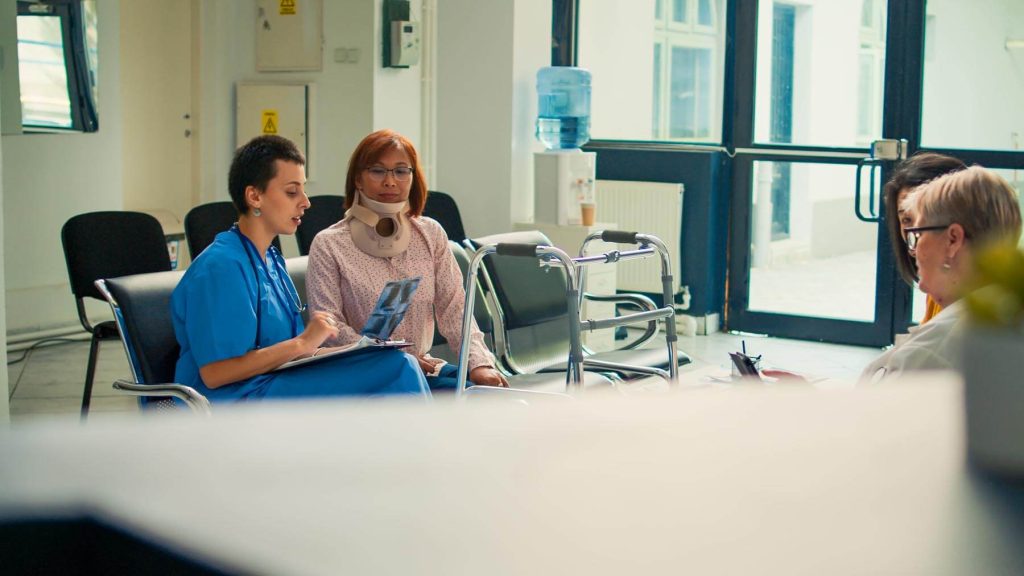
Maternity and Neonatal Safety Improvement Programme (MatNeoSIP): supporting perinatal optimisation in south London
In October 2023, the HIN hosted the fifth and final event in the Perinatal Optimisation Quality Improvement Collaborative that had been running since June 2022.
The focus of the series was improving the opportunities to optimise and stabilise the outcomes of the preterm infant through the nine interventions recommended by the British Association of Perinatal Medicine (BAPM) – you can access our blog summarising the event here. You can also view the video reel of our event here.
This improvement work has further accelerated into 2024 with the commencement of working groups. These groups were made up of people with different skills and abilities in some of the larger Trusts to tackle all nine elements simultaneously. Other groups initially focused on data quality to ensure full understanding of the root causes of issues.
We have seen a significant positive increase since April 2020 in the mean percentage of babies receiving optimal cord management especially. The P Chart demonstrates that the baseline percentage mean between April 2020 and March 2021 was 25.3%. The latest shift was in November 2022 to a massive 60.7% which has been sustained for the last 18 months.
Health Innovation Network (HIN) South London: Optimal Cord Management P Chart
2237 women in preterm labour at less than 34 weeks of gestation received intravenous intrapartum antibiotic prophylaxis to prevent early onset neonatal Group B Streptococcal (GBS) infection irrespective of whether they have ruptured amniotic membranes. This potentially means that 23 babies were born without GBS, saving the lives of 5 babies by preventing the onset of GBS sepsis.
Between 30-45 babies born at less than 34 weeks gestation potentially survived because their umbilical cord was clamped at or after one minute after birth.
* Data in south London from April 2020 to January 2024
Transforming wound care
The HIN has been supporting Bromley Healthcare Community Interest Company (CIC) in south east London, and Central London Community Healthcare (CLCH) NHS Trust in Merton, south west London to transform their lower limb wound care pathways.
Both community providers have introduced new, evidence-based wound care pathways that are recommended by the National Wound Care Strategy Programme (NWCSP). Bromley Healthcare CIC are piloting Healthy.io's Minuteful for Wound app and CLCH are using Isla Care. Some of the key changes are that patients are being treated with strong compression earlier on than in the previous pathway, and digital tools are being used to monitor healing of wounds.
The NWCSP report demonstrated that providing evidence-based care leads to:
- Faster healing of wounds;
- Improved quality of life for patients;
- Reduced likelihood of wound recurrence;
- Uses health and care resources more effectively.
A national real-world evaluation is currently underway and will be published in Summer 2024.
Medicines Safety Improvement Programme: improving care for people with chronic (persistent) pain by reducing opioid use
The patient safety collaborative at the HIN is one of fifteen patient safety collaboratives in England. As part of delivering a National Patient Safety Improvement programme, we have worked across our local system to improve chronic pain management by reducing harm from opioids.
The national whole systems approach ambition is to have 30,000 fewer people prescribed oral or transdermal opioids (of any dose) for more than three months.
It is estimated there have been 414 fewer deaths and 2,569 fewer cases of moderate harm due to long term opioids following the work of the Medicines Safety Improvement Programme since November 2021.
In August 2023 the south London reducing harm for people with chronic pain by reducing the prescribing of opioids website was launched. The website is a repository to share learning and insights from local quality improvement initiatives. These include co-designed solutions to improve chronic (non-cancer) pain, a pain awareness educational film series of experts by experience and a south London resource pack to assist clinicians with signposting to local services that can support self-management of people living with chronic (non-cancer) pain.
In January 2024, we launched our Opioid Action Learning Set series delivered in partnership with local and national clinicians affiliated with the British Pain Society, Royal College of Psychiatrists, Royal College of Anaesthetists and Royal College of General Practitioners. Twenty-six primary and secondary care clinicians enrolled onto the series to enhance their skills and knowledge to prevent inappropriate initiation of opioid treatment, as well as de-escalation and sustaining the de-escalation of opioids prescribed in chronic (non-cancer) pain and identifying change ideas to test in their clinical settings.
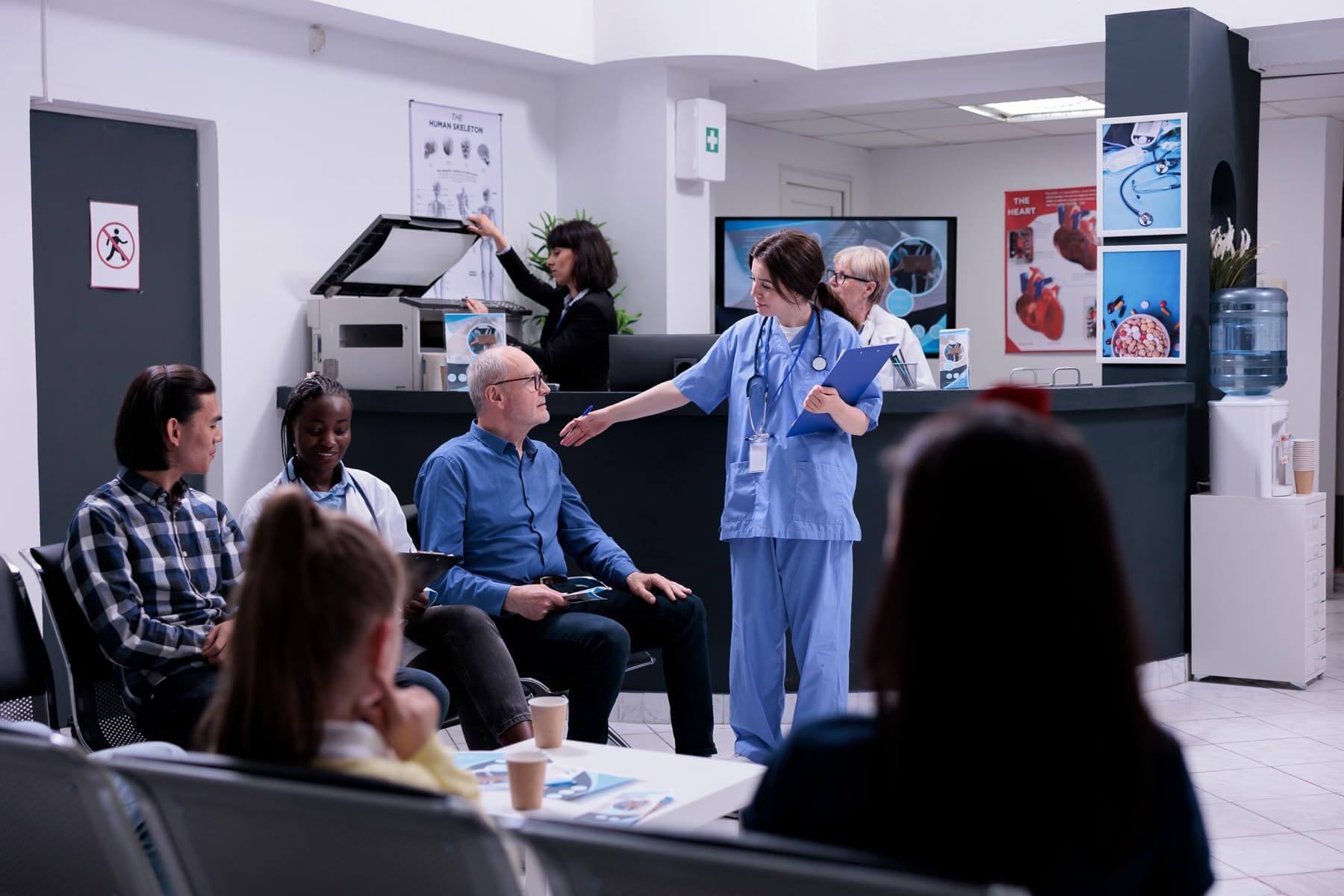
OneLondon Health Data Strategy
Over the last 12 months we have continued to support the OneLondon Health Data Strategy which is the collaboration of the five ICSs, NHS England London and other partners, working together to make London one of the healthiest global cities, and the best places to receive health and care.
Specifically, the project is designed to look at how to create the digital and data infrastructure that supports safe and integrated care, deep system understanding and intelligence, and innovation through research and development.
A key focus is now on the creation of a OneLondon Secure Data Environment. This will safely join up data from across London and drive collaboration to make London a world-leader in the use of data which supports direct care, system planning and business intelligence, research and development while protecting patient confidentiality. We have been supporting with engagement with citizen representatives, including the production of the first Annual Report for Citizens which highlighted the work to date, including four pathfinder projects which was the name for those who took on the challenge of being the first teams to look at what could be achieved if data was combined across more than one health system in London. These focused on asthma, high blood pressure, cancer and childhood immunisations
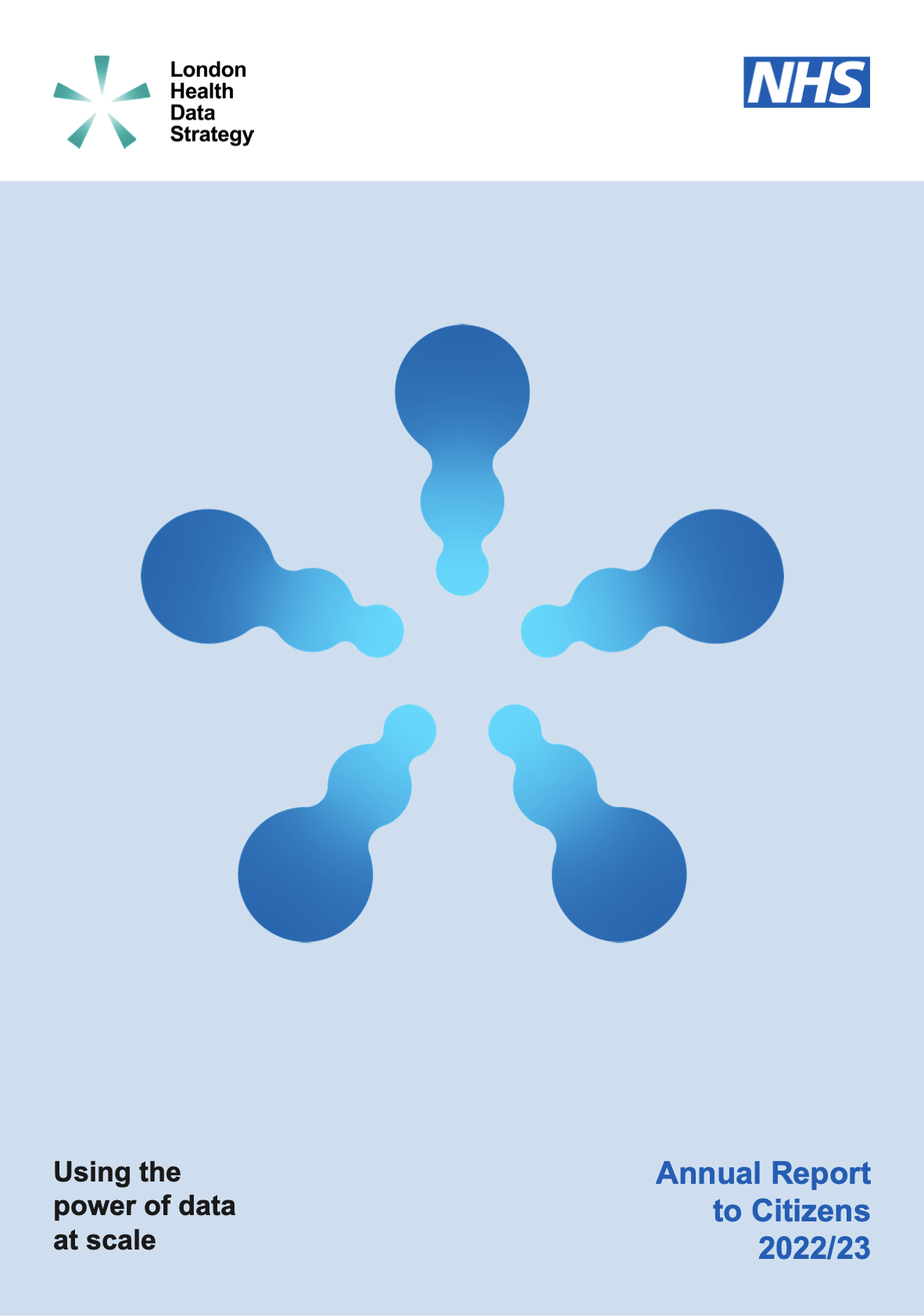
Clinical Research Network support
Recruiting early-careers nurses, Allied Health Professionals and scientists into working in health and care research has been a long-term challenge for the sector.
Working with the National Institute of Health and Care Research Clinical Research Network South London (NIHR CRN SL), we set out to understand why this was the case.
Through an innovative digital and social media audit supported by a number of in-depth focus groups, we identified a number of themes to inform future recruitment campaigns, including:
- Misconceptions about health and care research roles as being isolated from providing patient care;
- Opportunities to highlight the development of professional networks through the unique environment of health and care research;
- Demonstrating the variety of fulfilling roles available within the scope of clinical research.
These insights have already been shared nationally and locally and will help to drive recruitment of the next generation of clinical researchers, particularly those from diverse backgrounds.

Administering South West London Integrated Care System's Investment Fund
The South West London Integrated Care System (SWL ICS) established an Investment Fund in September 2022 to support the delivery of its Integrated Care Partnership (ICP) Strategic Priorities.
The funding aims to give partners the opportunity to suggest innovative projects that could have a big impact on health and wellbeing across south west London.
The Investment Fund is comprised of two funding streams:
- The Health Inequalities Fund: Funding for the health inequalities element is through national NHS Health Inequalities funding;
- ICP Priorities Fund: Funding for the innovation element is agreed annually by SWL ICS.
The HIN was commissioned by SWL ICS to support in the administration of the 2023/2024 Investment Fund, with a total funding allocation of £5.75 million. Schemes were selected by January 2024 through online and panel reviewing, and projects are due to be delivered by March 2025.
2Improving outcomes
Delivering health and care change programmes with a focus on long-term conditions and mental health to improve health outcomes.
By rigorously identifying specific needs within long-term conditions and mental health, the HIN tailors its approach to directly address the challenges patients and healthcare systems face, delivering health and care change programmes ensuring that initiatives are both relevant and impactful.
Central to our strategy is the adoption and spread of innovative solutions. This involves not only the introduction of new technologies and practices but also ensuring they are effectively integrated and adopted at scale. By fostering collaborations among healthcare professionals, academics, and technology developers, the HIN facilitates a smoother transition of these innovations into everyday clinical practice. This systemic approach helps to ensure that improvements in healthcare delivery are sustained over time, significantly enhancing health outcomes for individuals with long-term conditions and mental health issues.
Cardiovascular Disease Prevention Fellowship
The HIN’s Cardiovascular Disease (CVD) Prevention Fellowship is a nine-month programme which consists of clinical webinars, quality improvement training and support to run a QI project within their practice or primary care network (PCN).
The clinical webinars are delivered by local experts and were well received, with 100% of fellows stating they are more confident in delivering care to patients at risk of CVD.
This second iteration of the programme included a full day of face-to-face quality improvement training, which covered the QI methodologies and skills needed to set up, implement and evaluate a project. You can see the full collection of project case studies here. After the fellowship 82% of the fellows stated their confidence in undertaking QI projects ‘significantly increased’.
Pooling the impact data that was reported in the individual projects shows the huge impact of this programme. 1,845 patients were contacted about their CVD risk, 343 had individual consultations with a clinician and 288 had medications initiated or optimised to reduce their risk of cardiovascular disease. However, the impact of these projects goes beyond those patient interactions to the entire practice or primary care network (PCN). 96% of this year’s fellows agree that their practice/PCN has improved the way it manages the care of patients with CVD.
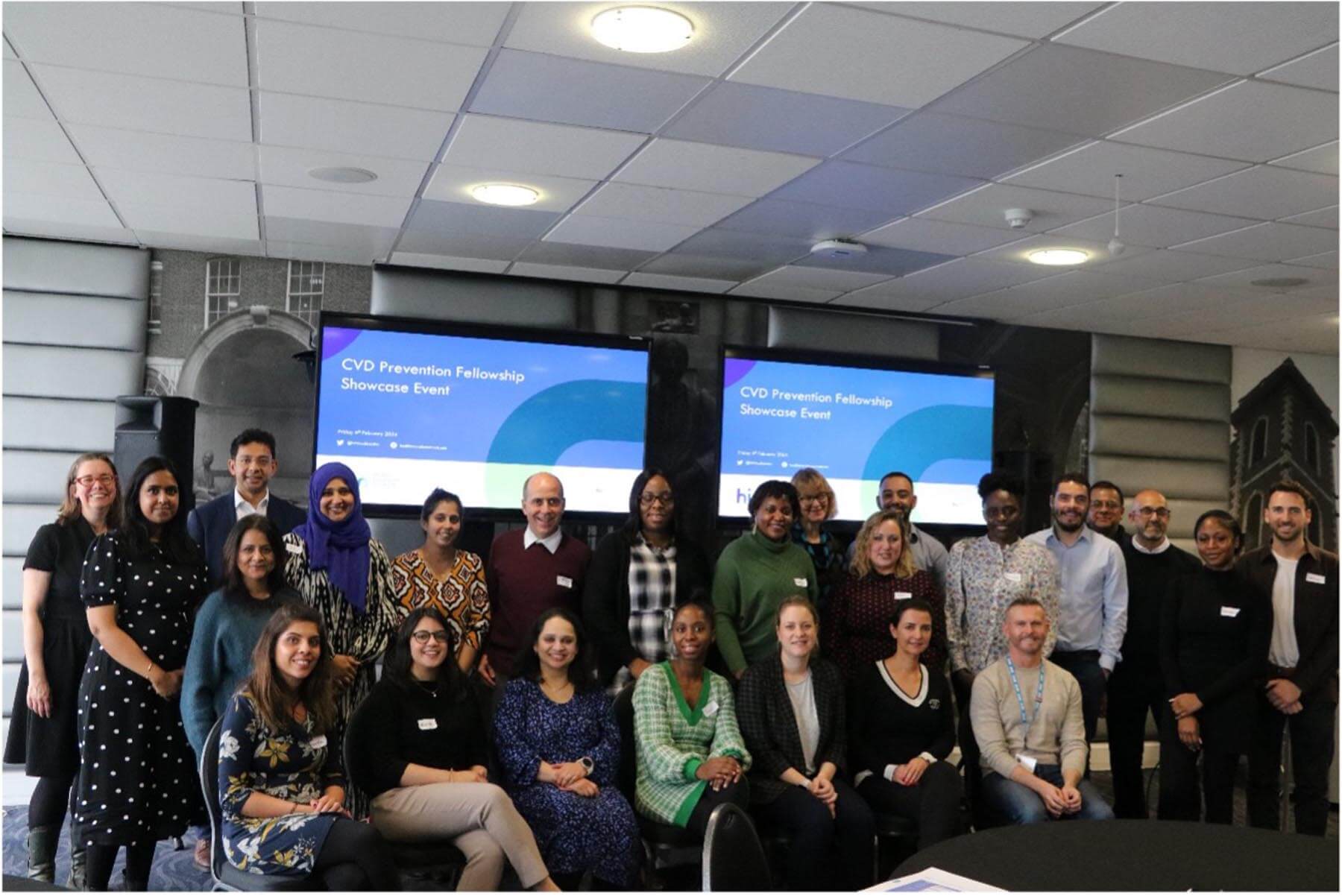
A graph of 2023 Fellows by borough and role
Through the collaborative learning I was able to tease ideas with colleagues, share challenges and solutions and find encouragement that I was not alone in the challenges I was facing and this kept me going.”
2023 CVD Prevention Fellow from Croydon
I appreciate the support and guidance I have received throughout the fellowship. Being a part of this programme has been an enriching experience, and I am grateful for the opportunity to contribute to improving care for this patient population.”
2023 CVD Prevention Fellow from Southwark
Mental health and physical health
Throughout 2023/24, the HIN has worked closely with local partners on a number of projects looking at physical health inequalities for people with Serious Mental Illnesses (SMIs).
Among other work, it looked at addressing inequalities in cancer outcomes for people with SMIs through a co-designed online resource to provide tailored content to support people with SMI to engage with screening programmes and cancer treatment.
First episode Rapid Early intervention in Eating Disorders (FREED)
2023/24 marked the conclusion of the national Early Intervention Eating Disorders programme, with the HIN publishing a final report on the FREED programme and supporting work to establish long-term sustainability of the innovative model at a national level.
The national programme, delivered in partnership with South London and the Maudsley NHS Foundation Trust and King’s College London, achieved remarkable results between 2020-2023:
National spread of interest or adoption to all 54 eligible NHS Trusts;
Increased access to early intervention for eating disorders, with 2,430 patients receiving FREED treatment;
Estimated cost savings to the NHS of £10.9 million;
Overwhelmingly positive feedback from FREED service users/carers, workforce and AHSN/ health innovation network leads.
Longer-term sustainability funding has now been secured for the programme, ensuring that young people across the country continue to benefit from faster access to eating disorders treatment and diagnosis. FREED was also nominated for an HSJ award in 2023.
Watch the video below to find out more about the FREED story:
Eating disorders service transitions learning resources
Working closely with South London and the Maudsley NHS Foundation Trust, the HIN developed eLearning resources for eating disorders professionals, focusing on improving transitions between child and adult services.
Co-designed in partnership with clinicians, service managers, young people and carers, the resources contain a blend of practical knowledge and personal perspectives addressing the key challenges of age-related transitions.
Since launching in February 2024 with the support of NHS England, the resources have been accessed more than 2,500 times.
The benefits of virtual wards: writing a sustainable business case
Virtual wards allow patients to receive care at home, rather than in hospital.
Since the inception of the national virtual wards programme in early 2022, the HIN has supported London’s virtual wards with market reviews, procurement specifications, pathway mapping and evaluations. Currently, the most pressing question is the sustainability of virtual wards as national funding is no longer earmarked and demand for inpatient beds continues to grow.
To support the development of local business cases we undertook a project – on behalf of NHS England London and London ICBs – to identify benefits of virtual wards, review evidence for those benefits, and identify data items to strengthen that evidence. The project involved interviews, an evidence review, a workshop with system stakeholders and a patient involvement focus group.
Our research identified four key areas of benefit of virtual wards:
- Patient experience and satisfaction;
- Staff benefits including releasing time for more personalised care;
- Clinical benefits, such as, reduced infection risk and deconditioning;
- Economic benefits including better resource utilisation.
Our findings have been widely shared on social media by stakeholders from across the system, and through conferences including Digital Health Rewired 2024.
Patient experience
- Improved patient experience and satisfaction
- More personalised and holistic care
- Improved quality of life
Staff benefits
- Improved staff experience
- Improved recruitment and retention of staff
- Released time to provide personalised care
Clinical and population health
- Decreased nosocomial infections
- Reduced deconditioning and inpatient falls
- Avoided harm of hospital stay
System and financial benefits
- Better use of finite resources
- Reduced avoidable non-elective admissions and re-admissions
- Improved ED performance
3Supporting innovators
Supporting innovators and the workforce in the health and care system to achieve faster adoption of innovations and drive economic growth – with a focus on digitally-enabled business models.
By fostering the rapid adoption of innovative technologies and practices, we not only enhance patient care but also stimulate economic growth. This dual approach benefits both the healthcare sector and the wider community. One of our key strategies involves supporting local boroughs, where economic development is closely tied to job creation. This initiative helps cultivate a thriving local economy bolstered by advancements in healthcare technology.
Moreover, the HIN plays a crucial role in guiding and assisting innovators who are eager to navigate the complexities of the health and care system. Through signposting, the HIN provides vital resources and connections, ensuring that innovators have the tools they need to succeed. This support not only accelerates the introduction of new solutions into the market but also ensures that these innovations are effectively integrated into existing systems, thereby enhancing overall healthcare delivery and economic vitality.
South London Care Home Pioneer Programme and Pioneer Alumni Network
Since 2018, the HIN, in partnership with My Home Life, has run a leadership and development programme for a cohort of care home ‘Pioneers’ (managers, nurses and senior staff) from across south London. The nine-month programme has supported more than 120 Pioneers from all 12 boroughs of south London. It is open to care home staff working in residential and nursing homes for older adults, learning disability and mental health care settings, and supported living settings.
The programme leads Pioneers on a journey of personal and professional growth through face-to-face workshops, action learning sets, mentor support and service improvement projects to enable them to make lasting improvements in their care homes.
At the December 2023 Celebration event, Pioneers fed back their experience of the programme. They spoke of achieving newfound confidence, making improvements in care via their service improvement projects, and gaining a deeper understanding of leadership dynamics. This was the largest cohort to date with 39 Pioneers completing the programme and over 30 producing posters to describe their service improvement projects, which included the introduction of electronic record keeping, education sessions and additional activities to improve residents' quality of life.
The HIN also now supports a Pioneer Alumni Network. This provides a regular opportunity for Pioneers to continue to meet as a community, to further their development, discuss and debate common challenges, share successes, and learn from guest speakers, such networks are an important way that innovation spreads across our region.
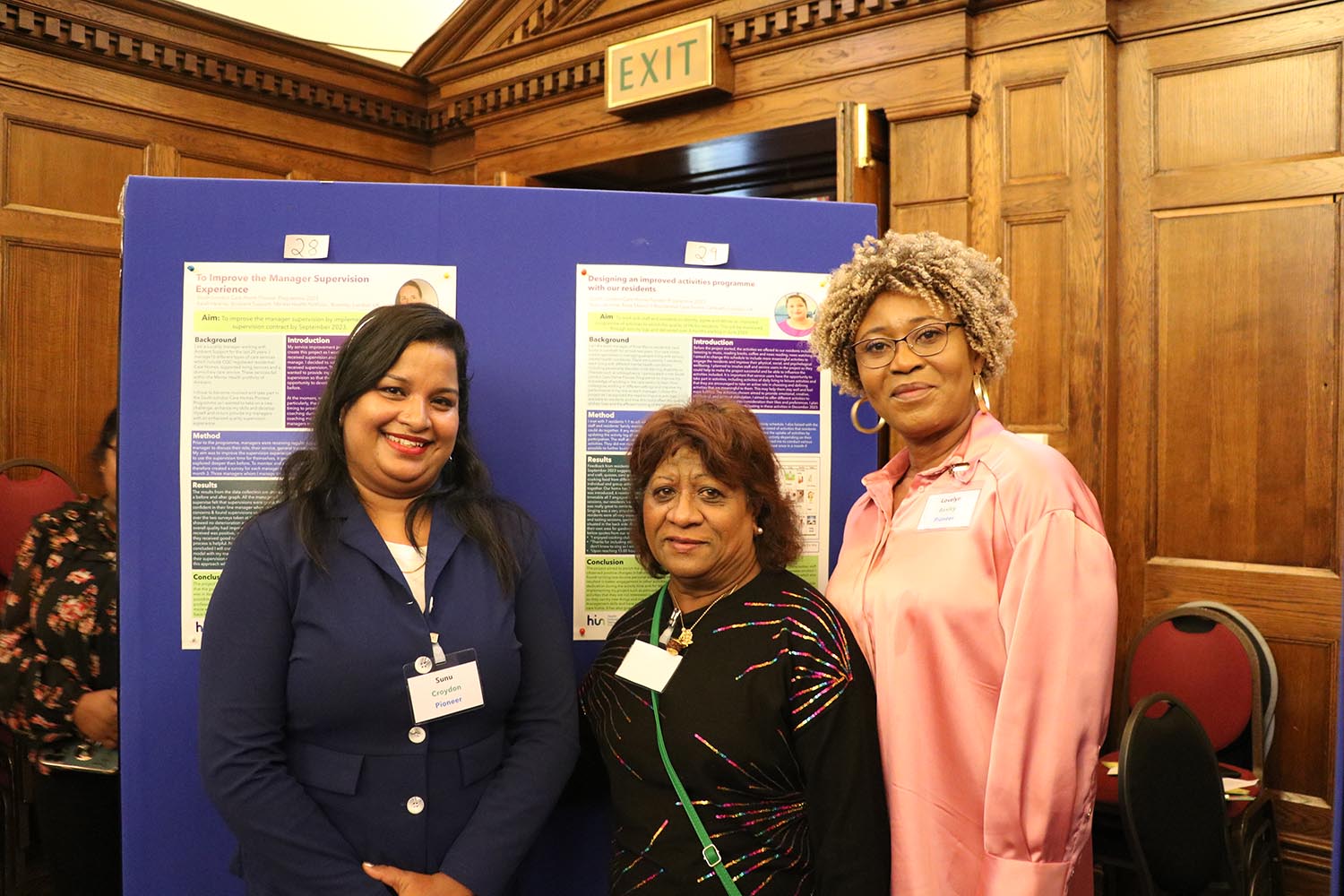
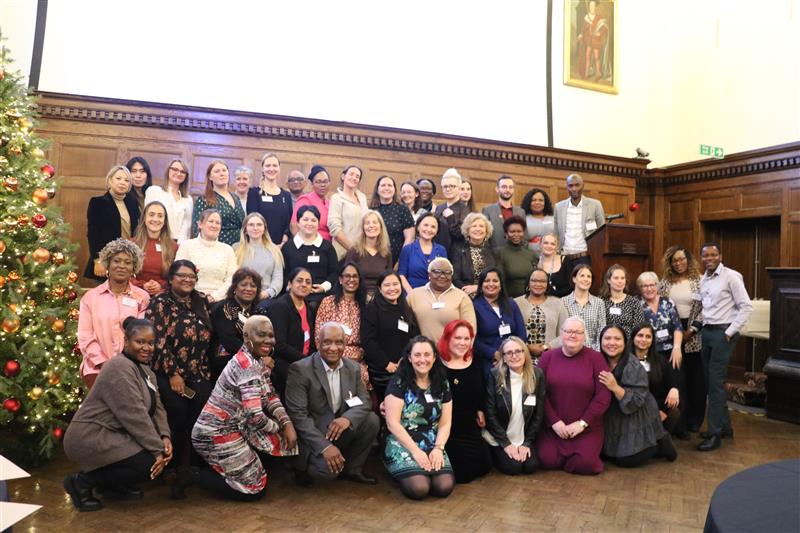
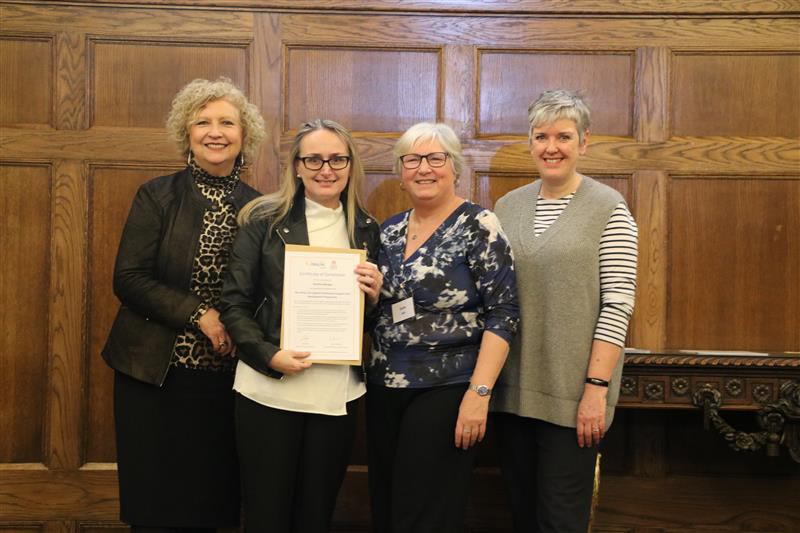
The programme has boosted my self-belief. I am so grateful to have been offered the opportunity, and the impact it will have for me and the home. It really made me feel valued.
Care Home Pioneer 2023
Attending the programme is possibly the best thing I have ever done! It has built my confidence so much.
Care Home Pioneer 2023
Being part of the programme has made me feel accepted, bold and seen.
Care Home Pioneer 2023

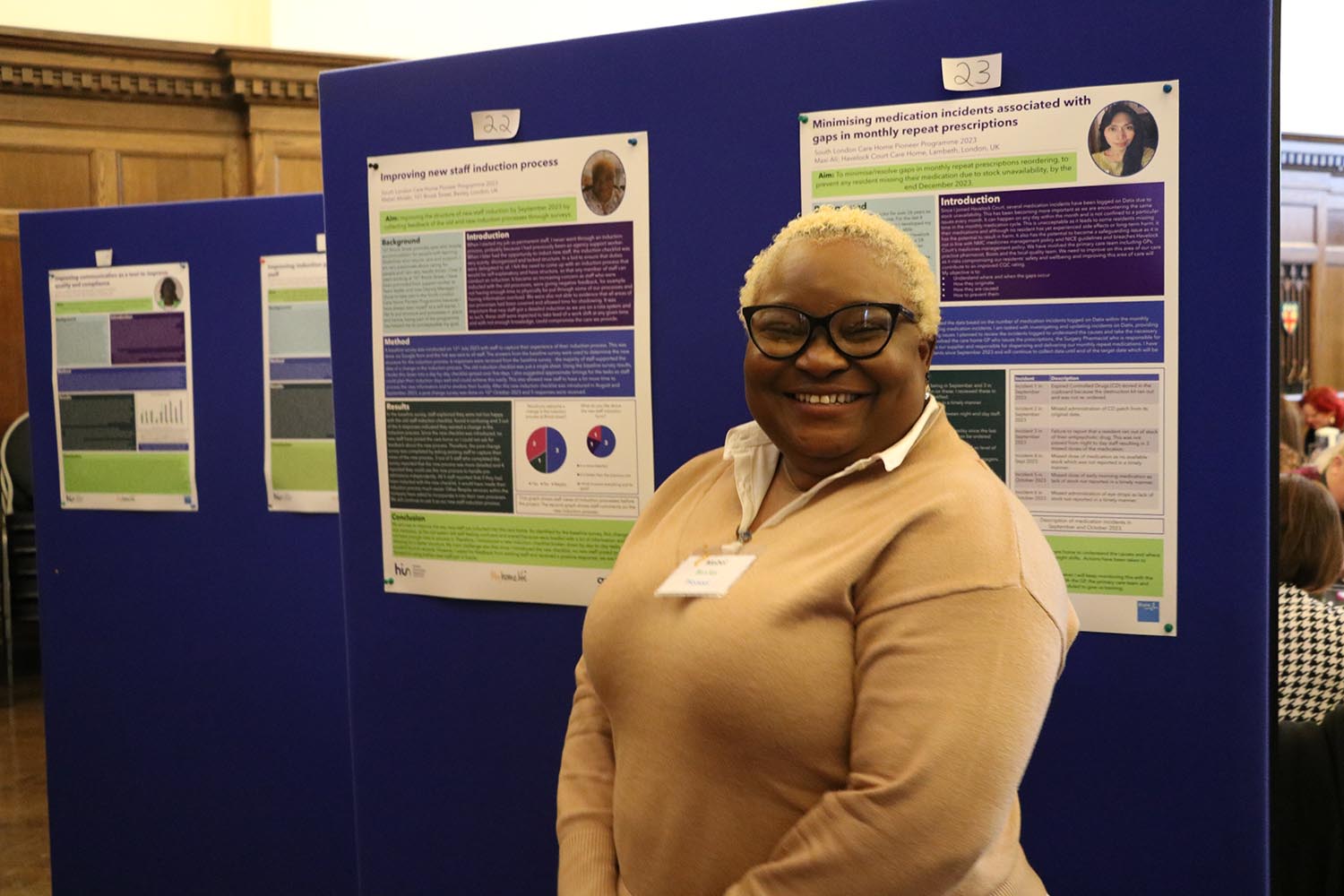
Supporting innovators through DigitalHealth.London
Accelerator programme
In 2023 cohort seven of the DigitalHealth.London Accelerator programme was launched. The Accelerator aims to speed up the adoption of technology in the NHS and social care ecosystem. It is a highly competitive 12-month programme for digital health companies that have products or services with high potential to meet NHS and social care challenges.
Following an extensive selection process, involving expert panel assessments and interviews, 17 companies were chosen to take part in the seventh cohort. As part of the programme, the companies are given bespoke support and advice, expert-led workshops and events, and a dedicated NHS Navigators who supports the brokering of meaningful connections between innovators and organisations with specific challenges.
The DigitalHealth.London Accelerator programme has now supported 160 companies in total.
Launchpad programme
Cohort six of the Launchpad programme began in January 2024 and it due to finish in April 2024. The programme received 35 applications and of those, 23 companies were chosen to take part. All 23 companies are due to launch their product from April 2024.
DigitalHealth.London Accelerator Alumni
DigitalHealth.London has worked with 160 Accelerator companies since its beginnings in 2016. We are proud to have worked with such a large number of innovators who have had success and support the economic growth of the region.
The DigitalHealth.London team continues to support its Alumni companies through a range of opportunities:
- Support for SBRI applications;
- Opportunities to present and speak at networking events such as the Accelerating Femtech Showcase and the Cohort 7 Accelerator Networking day;
- Opportunities to engage with new stakeholders as their products develop;
- Providing a forum for innovators to share knowledge and experience;
- Provide access to opportunities to bid for grants and apply for awards.
Our team also engages with the Alumni to demonstrate evidence of their growth and success through case study and blog publications. Some notable success stories we have heard from Alumni over the past 12-months include:
- The partnership of iPLATO and Lifelight to bring convenient blood pressure monitoring to 3 million users of the myGP app;
- Skin Analytics being awarded £2,157,038 by the NHS Cancer Programme – supported by SBRI Healthcare and the Accelerated Access Collaborative to streamline the assessment process of skin lesions where there is a suspicion of skin cancer.
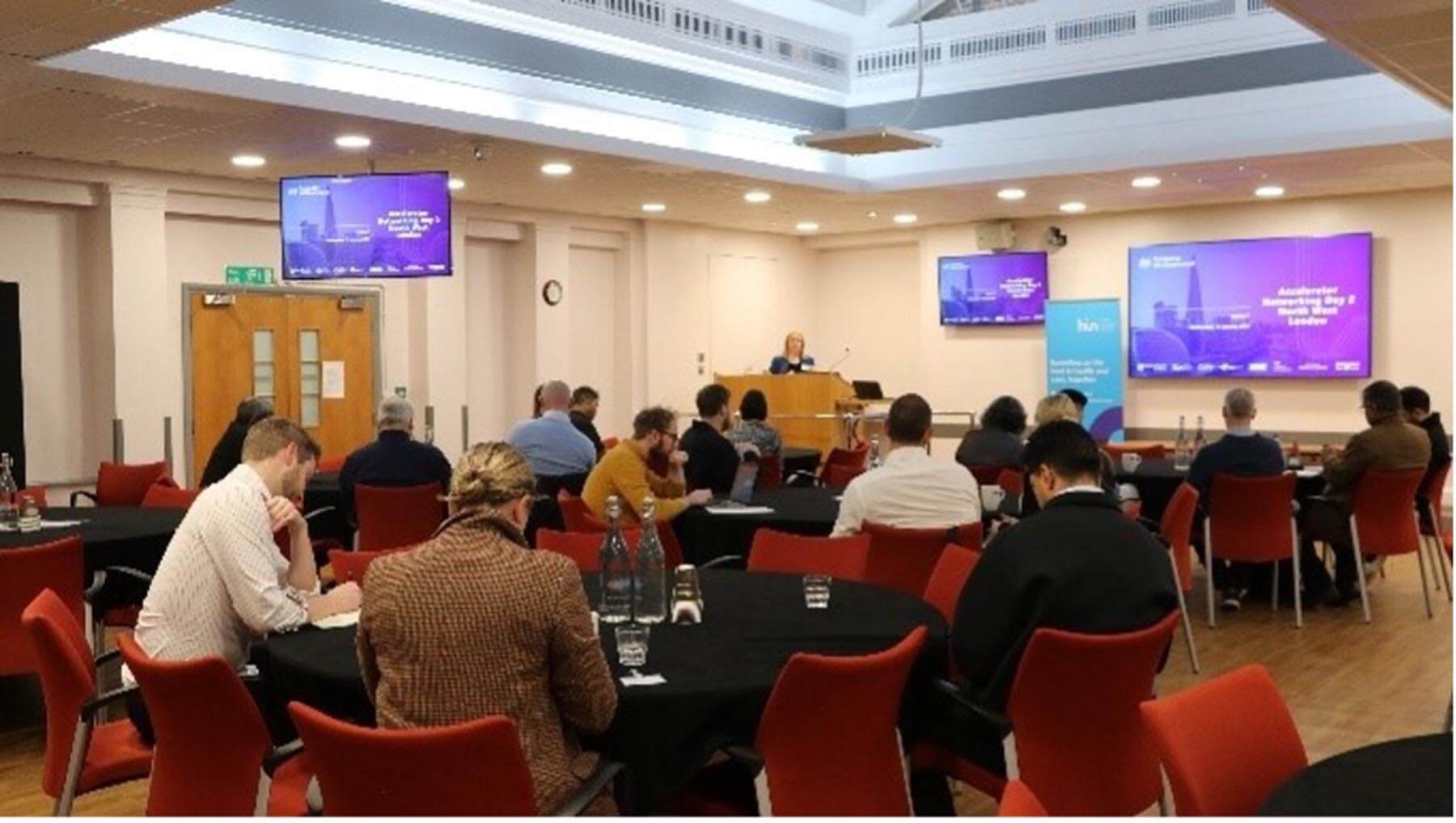
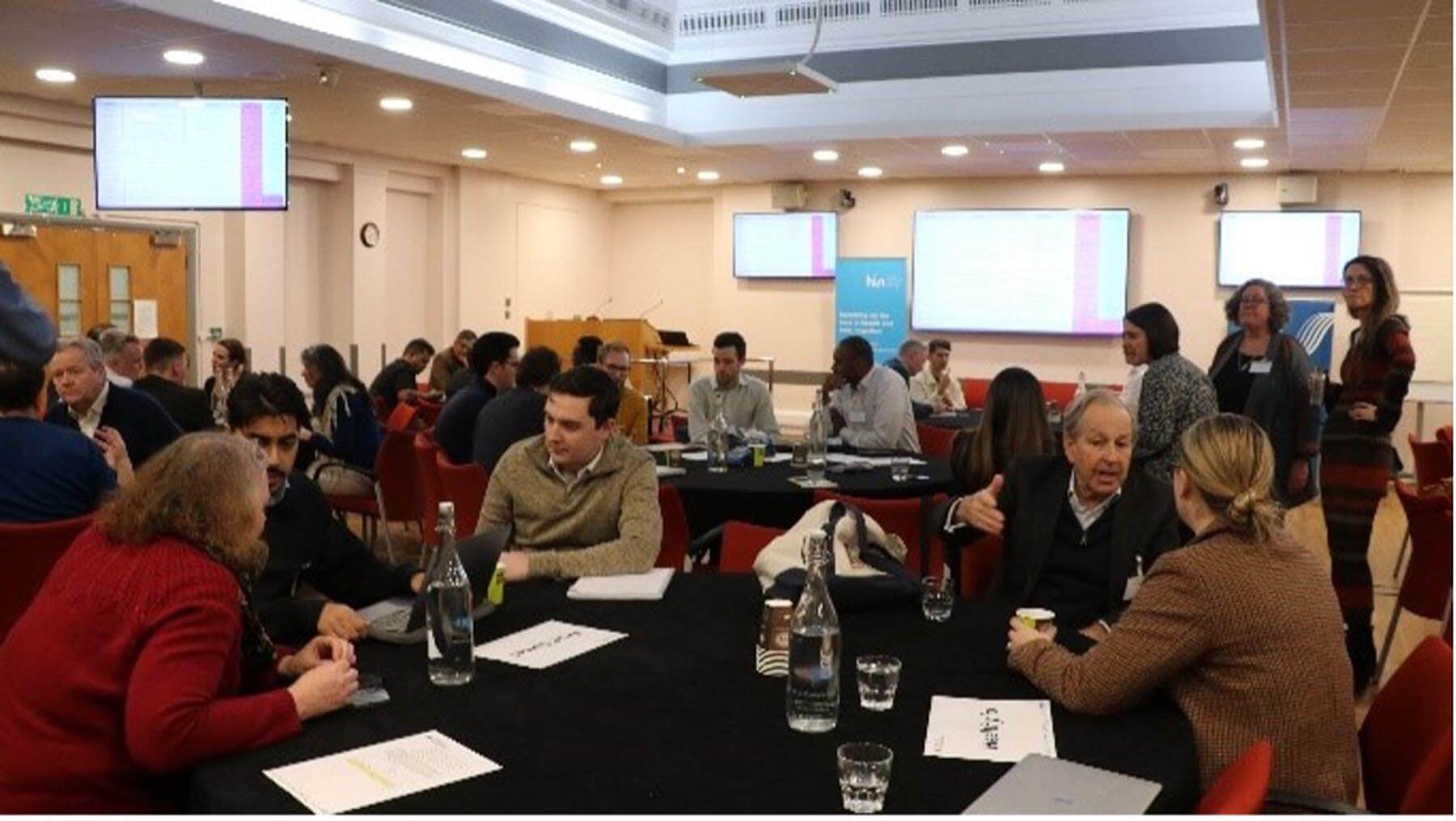
Supporting the healthcare workforce
The Digital Pioneers and Horizon Fellowship provides leadership guidance and learning to those leading innovative digital health and care initiatives within the health and social care system.
These initiatives empower Fellows driving positive change in the NHS and wider healthcare industry through digital technologies, helping to develop the digital skills of the NHS workforce. Over six Learning Days, Fellows cover topics including business case development, user engagement, evaluation, and change management.
To date, 112 people have taken part in Digital Pioneer Fellowship programmes, with all projects directly or indirectly leading to either improved patient care and/or experience. 60% of fellows in the latest cohort reported a promotion, new job or secondment during the support and 80% could cite specific examples of positive gain from the network. Across the first three groups, 55 digital technologies have been adopted.
The programmes are currently delivered across the South West London Integrated Care System (SWL ICS) and Chelsea and Westminster Hospital NHS Foundation Trust. The 39 fellows in SWL ICS, selected from various Local Authorities, NHS Trusts, primary care, charitable and community organisations, have projects impacting over 12 million patients and 132,000 NHS/social care staff. The 17 Horizon Fellows’ projects are estimated to impact at least 8,000 patients and 800 staff yearly.
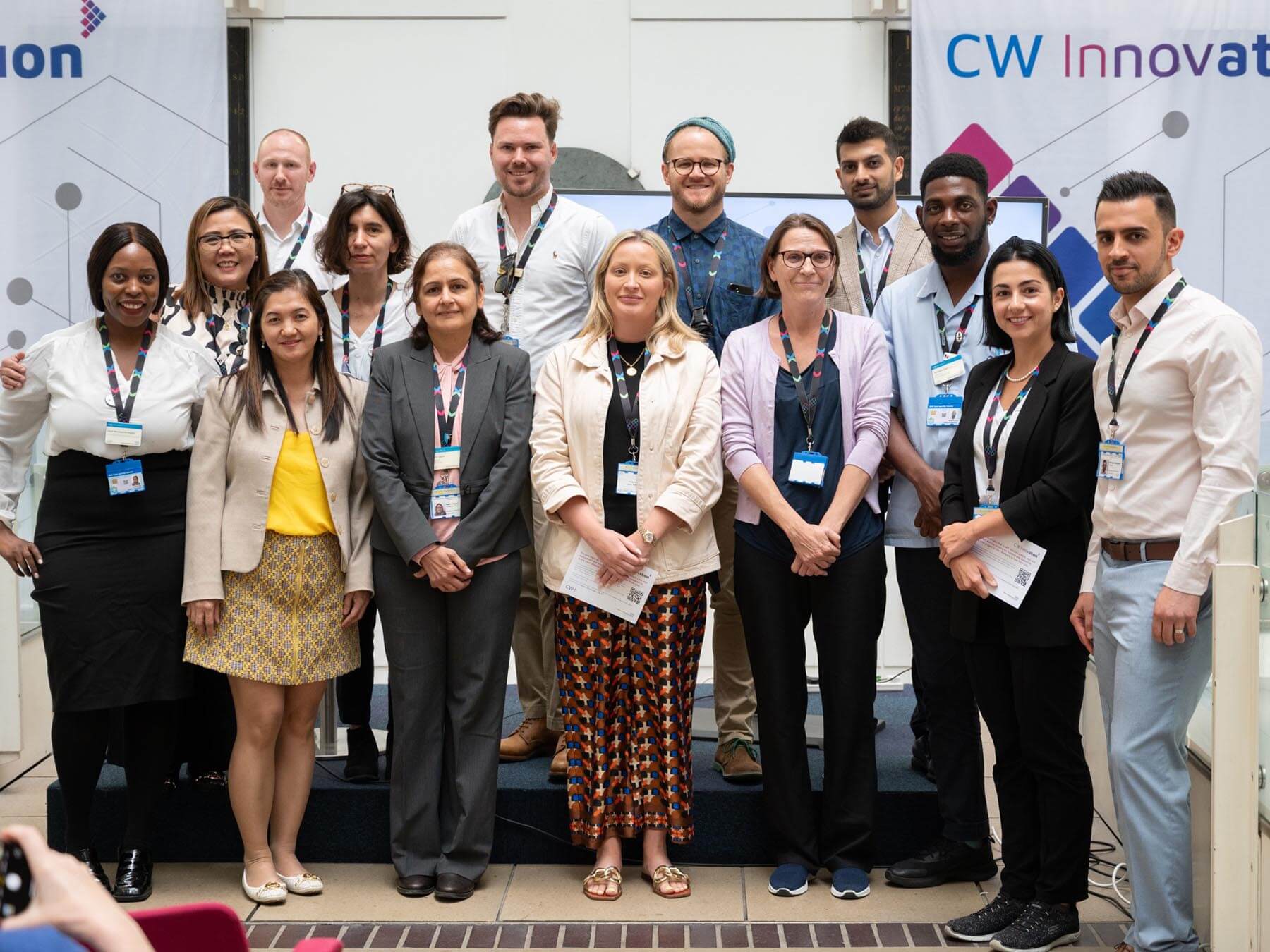
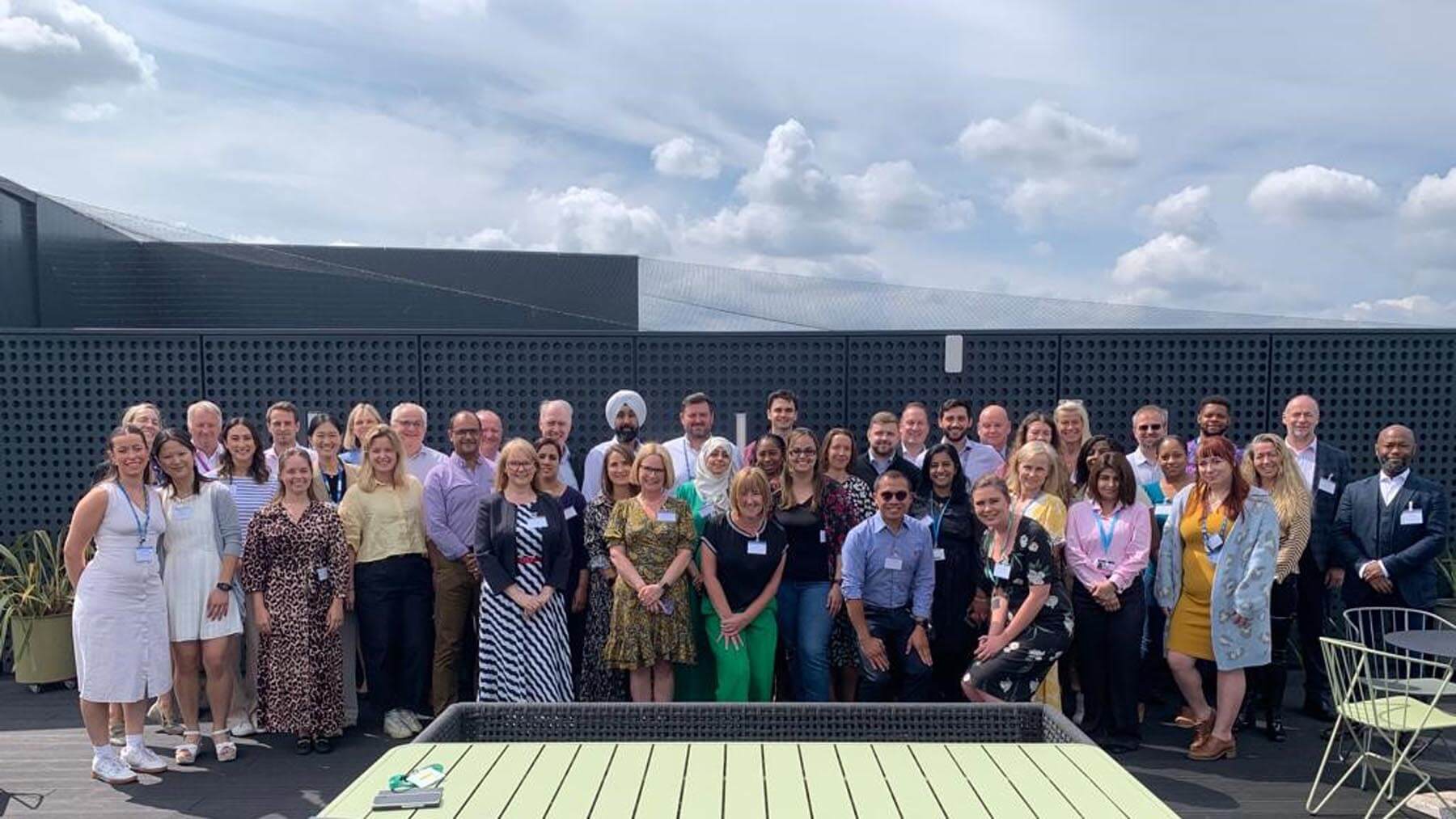
Accelerating FemTech
In May 2023, the HIN, CW+, and Health Innovation North East North Cumbria were chosen to lead Accelerating FemTech, one of four pilot accelerators commissioned by Innovate UK and the Medical Research Council. This initiative aimed to boost early-stage FemTech innovations and fast-track their development.


The "Inspire" phase began with expert-led webinars and in-person events, attracting over 300 participants. For the "Accelerate" phase, 86 high-quality applications were received, with 12 companies selected after rigorous review and interviews. Over the 10-week period, participants attended workshops and received one-on-one coaching from business mentors and subject matter experts. The programme concluded with a successful showcase event at the Science Gallery.
Feedback from participants was exceptional, with a Net Promoter Score of 66.7, and all companies indicating that they would repeat the programme. Participants also had the opportunity to apply for up to £100K in Biomedical Catalyst (BMC) feasibility funding, supported by grant writing workshops. Though we are still awaiting to hear the results of the BMC, the success of Accelerating FemTech emphasises the significance in addressing underrepresentation in FemTech innovation funding and research. Plans are currently underway for future initiatives in this space.
DigitalHealth.London Leap programme
DigitalHealth.London’s Leap programme is aimed at mentoring and supporting founders who are underrepresented in the digital health sector, including people from ethnic minority backgrounds, women, and individuals with disabilities and people who are neurodiverse.
The programme is designed to foster inclusivity and providing tailored assistance to these underrepresented founders, ultimately removing obstacles to success through a comprehensive support package that includes mentoring, peer support, learning opportunities, networking, and potential investment or funding support where needed.
Launched in March 2024, the nine-month programme has successfully enlisted 29 participants. Among these diverse founders, 15 are women, nine identify as being disabled or neurodiverse, and 21 identify as being from an ethnic minority. Their innovations cover various aspects of primary, secondary, and social care, ranging from automating functions to creating innovative platforms for healthcare professional training and wellbeing support.
The DigitalHealth.London Leap programme also features mentoring opportunities from a dedicated and diverse programme advisory panel consisting of subject matter experts in their respective fields.


Net Zero: to support new procurement rules
In February 2024, DigitalHealth.London launched a Net Zero initiative, aligning with NHS England's national aim of achieving Net Zero by 2040.
This initiative assists London-based SMEs in digital health and social care to understand the NHS's new procurement rules under their Net Zero agenda, while empowering them to devise their Carbon Reduction Plans.
So far, 27 digital health companies have benefited from two complimentary half-day workshops facilitated by NHS London Procurement Partner's (NHS LPP) Net Zero specialists. Participating companies are encouraged to submit their carbon reduction plans for review and feedback from the NHS LPP Net Zero experts.
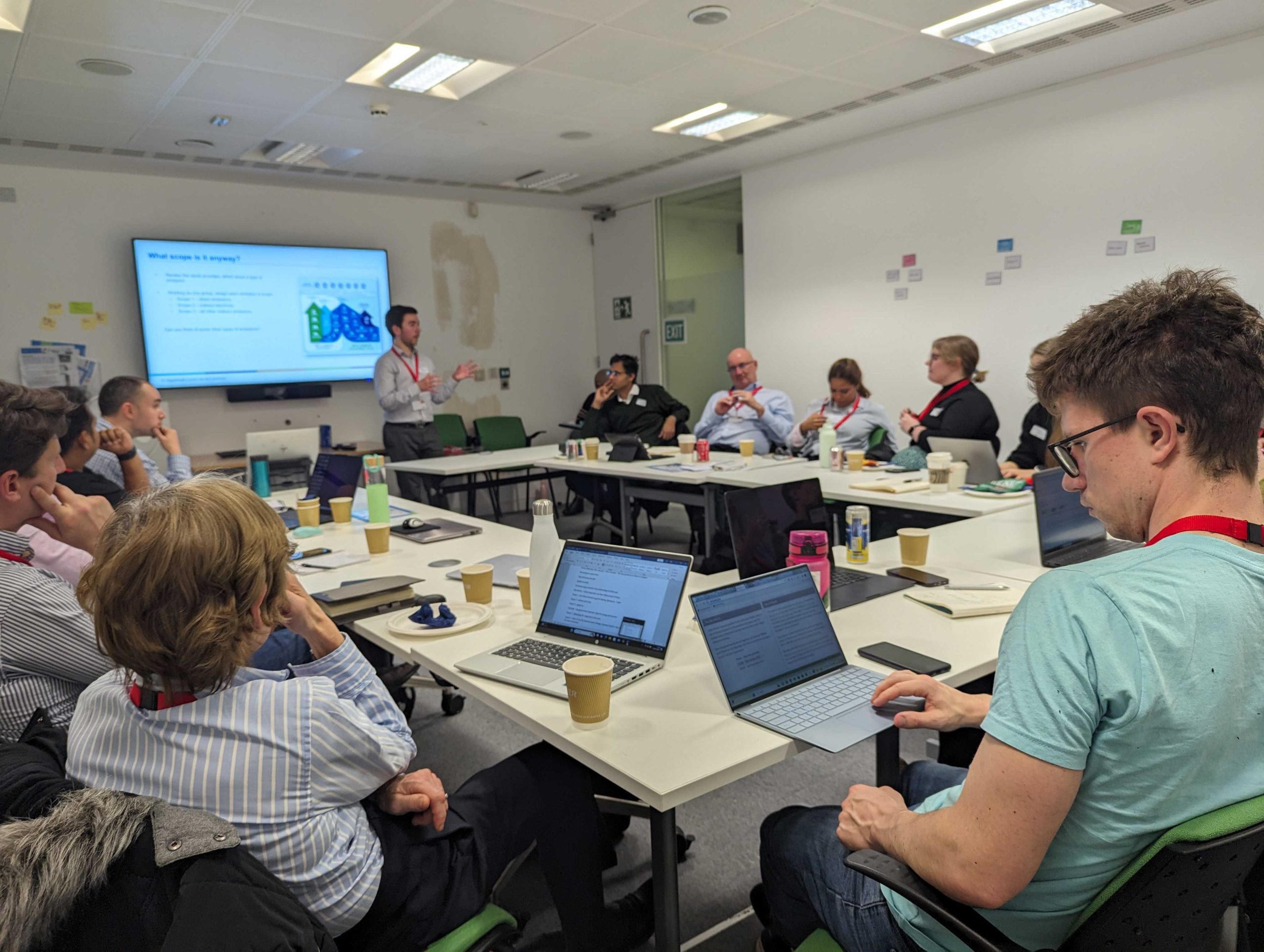
How innovation supports economic growth
Connecting innovative solutions to health and care systems to drive economic growth and improved outcomes for patients and services
Through our innovation clinics, digital health innovator programmes and interactions with industry partners, we provide an ecosystem where innovations can be directed into their optimum market to help address the actual problems and challenges facing the system.
This activity supports levels 1-4 of the Office of Life Sciences (OLS) innovator support system. Our offer ranges from one-off advice and guidance sessions, to longer-term facilitation of engagement with local system providers, through to support over multiple years through participation in one of our innovator programmes leading to extended funding opportunities.
As a result of our engagement with innovators we evidence their economic growth through several different metrics; the number of jobs they create, the number of new contracts and pilots they secure and the amount of investment they raise. In the case of a single DigitalHealth.London Accelerator cohort, we can see that we have supported companies to create 102 jobs, secure 181 contracts and pilots and raise £35,178,800 of funding.
Graduates into Health Scheme: 2018-2024
The HIN has been running the flagship Graduates into Health programme since 2018. Over the past six years the programme recruited graduates and early careers professionals from across the UK and internationally to fill digital, data and technology roles throughout England. The programme, funded by NHS England, closed on 31 March 2024.
Over the past six years the scheme supported 240 graduates and over 77 Trusts and healthcare providers across all nine English regions. The scheme enjoyed a consistent 91% retention rate ensuring grads stay within the NHS once they complete their placement, and a 99% progression rate from Band 5/6 roles to Band 7/8a roles – demonstrating the scheme’s commitment to developing outstanding leaders within the NHS.
Find out more on the Graduates into Health programme’s success below.
We often struggled to get suitable candidates and so a typical recruitment would take far longer than 6-8 weeks because we’d have to go out again and again. We recruited for one position through the Graduates into Health programme and were so impressed with the quality of the candidates that we ended up taking two!”
NHS Informatics Merseyside Software Developer Manager
Recruited 71 graduates into 26 Trusts to support the Electronic Patient Record (EPR) implementation ranging from configuration analysts, integration engineers, software developers and cyber security analysts.
Recruited six graduates into business-as-usual roles ranging from software developers to data analysts across six Trusts.
Held more than 77 assessment centres over the last financial year 2023-2024.
Provided pastoral support to 130 graduates including networking sessions, interview preparation, job hunting for programme leavers, induction support, technical training plans, apprenticeships and guest speaker workshops.
Administering a regional Automation Grants programme
Automation is the design and implementation of technologies to provide services with minimal human involvement. The NHS England (London) Digital First Primary Care AI and Automation Grants Scheme aimed to streamline high-volume, low-risk, routine tasks across primary care with automated solutions.
The HIN-administered scheme ran from October 2022 to November 2023. Grant applications were assessed on scope, scale, impact, sustainability and opportunities for spread and adoption. Over £600,000 was awarded, and 14 automations were launched across 11 pilots in London. The pilots focused on six themes: pathology, new patient registrations, call and recall, workforce rota management, clinical safety and clinical document management.
The final report was published in Spring 2024. During the pilots, approximately 18,000 online new patient GP registrations were validated and automatically uploaded into clinical systems while an estimated 20,000 ‘normal’ pathology results were automatically reviewed and filed.
There have also been moves towards implementing piloted solutions long term. This includes GP super-partnership, Modality, which now has 35 live EMIS and TPP RPA processes across general practice and community outpatient settings. As a result, over 100,000 items have been processed to date.
Another notable achievement was the pioneering use of WhatsApp for call and recall. Islington GP Federation’s pilot was the first to be formally approved by the NHS IM1 team for the utilisation of an AI chatbot through WhatsApp.
Accelerating evaluation and adoption of Ambient Voice Technologies through a 'challenge model'
Ambient Voice Technologies (AVT) are an application of AI to generate summaries, notes and order tests based on listening to the conversations between clinicians and patients.
The accelerating evaluation and adoption of AVT through a 'challenge model' project focuses on addressing clinician burnout and workload, which was recognised as a national emergency impacting patient safety. Leveraging AVT, the initiative aimed to alleviate administrative burdens by revolutionising clinician interactions with electronic systems.
The project, led by the HIN, involved identifying potential AVT suppliers and organising an innovation exchange to showcase the technology's capabilities. The live and unscripted demonstration was presented to key figures in the NHS, including Dr. Vin Diwakar, Medical Director for Transformation.
The Exchange gathered 22 leading professionals and key points highlighted include AVT's departure from traditional digital dictation by employing AI for initial report generation, the necessity for widespread access to speech recognition technology among clinical staff, and the integration of future AVT with Electronic Health Records (EHRs) and decision support tools.
This led to continued conversations with NHS England leaders to develop a plan to identify testing sites for current AVT products, assessing feasibility and recommendations for widespread adoption and a subsequent trial launched across eight London sites.
Phase 2 of the South East London Cancer Alliance and HIN's innovation partnership
The cancer system has grown to be highly complex, with many interdependencies between services and care delivery in primary, secondary and tertiary care. New and emerging technologies have been making significant impact in cancer pathways and care delivery, supporting early detection, faster diagnosis and equipping patients to better manage their care and clinicians to deliver care.
To support local challenges and national priorities in cancer care, the HIN has continued to develop its innovation partnership with the South East London Cancer Alliance (SELCA). This partnership is centred around accelerating the opportunities for innovation in cancer care, sharing good practice from cancer alliances and providing expertise to perform horizon scans and navigate potential solutions on the market.
As part of this work we facilitated a face to face prioritisation workshop with SELCA programme leads to review challenges experienced by patients and staff alongside issues within operational processes across various cancer pathways, with the aim of identifying key opportunities for innovation.
Transforming cancer pathways with automation remains an exciting area for innovation. Building on the prioritisation workshop, the HIN has supported SELCA with an in depth market review of robotic process automation providers, showcasing the possible use cases of automation to increase operational performance and improve cancer care outcomes.
Early Diagnosis and Screening
Clinical records and other data should seamlessly cross over and join up from government to local levels. A potential solution is the adoption of a 'Holistic Approach', facilitating information integration both at the system and patient level. Additionally, leveraging 'Automation' can alleviate challenges and ease burdens for clinicians and administrators.
Faster Diagnosis & Operational Performance
Not everyone needs looking at at the moment, if you don't have stratified ways of looking at the pathway, you're burning out a very small group of admin staff to keep track of it, for example - a patient might do a diagnostic, but there's pathology. How do you link up the two?
Personalised Care & Treatment
"Patients that used to be physically active and then don't return because they don't know what's safe to do and what's not. We then talk to people two years out of treatment, and they say nobody explained the benefits of physical activity."
"Our Quality of Life survey results shows that patients ~18 months post diagnosis and treatment are struggling, and that actually the things they're struggling with could be mitigated for much earlier in the pathway."
Quotes taken from innovation prioritisation interviews with SELCA programme leads
4Evaluating innovation
Evaluating the effectiveness of innovations in real-world settings and generating evidence to identify which innovations should be adopted in health and care.
The HIN is at the forefront of integrating and assessing innovative healthcare technologies within clinical environments. This approach involves validating health and care solutions in real-world settings to ensure their effectiveness and adaptability. By conducting evaluations, including real world validation and health economic impacts, we gather crucial evidence that aids in discerning which innovations are practical and beneficial for wider adoption.
This process not only underscores the reliability of the innovations but also emphasises their impact in everyday healthcare scenarios, ensuring that they meet the high standards required for implementation in diverse health and care systems.
Virtual ward evaluations: London-wide review
Virtual wards (also known as hospital at home) allow patients to get the care they need at home safely and conveniently, rather than in hospital.
In August 2023, NHS England (London) commissioned the HIN to lead a rapid review of virtual wards to inform winter planning, identify further opportunities for optimisation and consider the case for longer term sustainability. This included:
- Interviewing 30 virtual ward stakeholders;
- Reviewing existing evidence on virtual wards;
- Partnering with Guy’s and St. Thomas’ NHS Foundation Trust’s Clinical Engineering team to review virtual ward standard operating procedures;
- Exploring how data might be used to better understand virtual wards operations and impact.
The review was overseen by a regional task and finish group involving strategic and operational stakeholders who met weekly with the HIN to refine the insights and recommendations.
Based on the insights gathered in the review, we proposed key recommendations to support further refinement and expansion of virtual wards. The findings and recommendations were shared across London to inform the continuous improvement of virtual wards, to drive even more benefits for Londoners and health and care staff, whilst also enabling efficiencies to be realised across the NHS.
Dermatology Improvement Collaborative
Since 2020, the HIN has delivered the Dermatology Improvement Collaborative programme. This programme has supported a number of dermatology services across London and the south east of England to pilot teledermatology – the use of static digital images to triage, diagnose, monitor or assess skin conditions to improve dermatology pathways.
A full report has now been published providing in-depth analysis of each of these transformation projects and their impact on key outcomes, such as service efficiencies, as well as challenges and learnings. Key themes include:
- Reduced need for secondary care appointments: implementing teledermatology into referrals and advice and guidance requests from primary care often meant that patients could be discharged or managed in primary care, reducing the need for secondary care appointments. When appointments did take place, they were often shorter.
- More patients seen in the right clinic more quickly: virtual triage appears to allow for redirection of referrals onto the appropriate clinical pathway with fewer delays.
- Considerations for spread and adoption: including working at regional level to develop standardised approaches to implementation, addressing technical challenges, workforce planning and successful engagement with primary care.
Understanding people’s views on digital technologies
NHS England (London) Digital First Patient Perspectives project
The Patient Perspectives project aimed to better understand patient awareness and experience of using digital tools in primary care across each of London’s five Integrated Care System (ICS) regions. The project primarily focused on usage and experiences of three key digital tools: Online Forms (also known as Online Consultations), the NHS App and GP surgery websites.
The HIN worked alongside the London Digital First team and ICS colleagues to co-design the methodology for collecting patient perspectives on the tools. This included a scoping phase, analysis of existing data, a London-wide online survey and virtual focus groups to explore key themes in more detail.
More than 3,000 patients contributed to the report, which indicated that most people found online consultation forms, the NHS App and GP surgery websites allowed them to complete key tasks related to managing their health. Three out of four patients had used these digital tools to access primary care services, and benefits such as the convenience of digital access were identified.
The research also provided patients with the opportunity to make recommendations for improvement, which included extending the times at which tools could be accessed and ensuring compliance with usability and accessibility standards. Access the full report and ICS-specific case studies here.
Patient perspectives of digital health technologies in mental health
Key findings include mixed public perceptions of DHTs: the flexibility and anonymity provided by DHTs was appreciated, enhancing convenience and addressing mental health stigma. However, barriers such as a preference for human interaction, concerns over data privacy, fear of limited treatment options and a lack of awareness about DHT effectiveness deter wider adoption. The report identifies personal recommendations and professional support post-recommendation as crucial for engagement with DHTs.
Demographic factors like age and digital literacy influence openness to utilising these digital tools. To increase DHT acceptance, our report suggests enhancing public and professional education on DHTs, supporting healthcare professionals in DHT integration, promoting hybrid care models, optimising user experience, and ensuring patient autonomy in treatment choices.
Patient perspectives of digital health technologies in mental health: key figures
Healthcare referrals to DHT:
From our survey, 60% of participants indicated that they had been recommended DHTs during a consultation or by their healthcare provider
Introducing our lead health economist
Anna Buylova joined the HIN’s Insights team in December 2023, primarily focusing on integrating a health economics strand into evaluations and also supporting other teams within the HIN with health economics expertise.
Here Anna gives an example of how her expertise is helping projects understand health economics:
“A cost calculator in health economics is a quantitative tool that can be used to calculate resource use associated with an intervention, or to answer questions around efficiency in the provision of specific health services. It can be created for its own sake, for example to estimate resources needed for an intervention, or can be fed into economic evaluations, for example to evaluate changes in costs related to an intervention.
“The main types of costs that we encounter in health economics are direct costs (actual costs incurred by providers, patients/households in relation to specific health intervention), indirect costs (such as productivity losses related to illness) and intangible costs (such as pain, depression or lost quality of life).
“As a practical example, we have been working with colleagues at York Health Economics Consortium (YHEC) to develop a cost calculator for the provision of virtual words. As a resource use tool, it allows decision makers to consider the full costs associated with virtual wards, such as time spent by healthcare professionals in providing care or monitoring, costs of technology, such as set-up and licensing, as well as costs associated with hospital admissions and Emergency Department attendances."
DigitalHealth.London Evidence Generation Bootcamp
Following the success of our Evidence Generation Bootcamp programme in 2022 and through funding from UK Shared Prosperity Fund (UKSPF), the second cohort of the Bootcamp launched in early 2024. This programme aims to support digital health companies to understand NHS England and NICE policy and guidance for evidence generation in digital health and work with academics and researchers in the sector to drive their evidence generation forward.
Working with around 15 companies over a 12-week period, the programme includes:
- Workshops focusing on the NICE Evidence Standards Framework for Digital Health Technologies;
- 1-to-1 consultations with academics and researchers to support the development of research and evidence generation proposals;
- Opportunities for companies and researchers to collaborate and engage in knowledge transfer activities.

The international TeleRehaB Decision Support System project
Supported by Innovate UK funding, TeleRehaB DSS Decision Support System (DSS) is a partnership developing AI-based telerehabilitation solutions for people experiencing balance problems after a stroke, delivered via augmented reality (AR). The technology can also be used with people experiencing Mild Cognitive Impairment (MCI) or long Covid-19.
The project is being delivered by an international consortium of academic partners and experts in the field from across Europe and Thailand. Members of the project team include University College London, Universitae Klinikum Freiburg (Germany), National University of Athens (Greece) and Chulalongkorn University (Thailand) and there are teams working in Spain and Portugal.
The Health Innovation Network (HIN) South London is leading on the communication and dissemination activities relating to running workshops and webinars. UK participants in Horizon Europe Project TeleRehabilitation of Balance clinical and economic Decision Support System are supported by UKRI grant number 10070260.
The TeleRehaB DSS project uses AI technology to make balance physiotherapy more available to non-specialist practitioners, through the introduction of guided diagnostic tools and personalised intervention-selection aids. These interventions are then delivered in the patient’s own home, with an AR “physiotherapist” guiding the patient through a tailored rehabilitation programme.
Digital perioperative complexity tool
Addressing the long wait list for elective surgery is a current challenge in perioperative care. Identifying patient complexity earlier in the pathway will help to improve utilisation of high volume low complexity (HVLC) elective surgery hubs by fast tracking low complexity patients and reducing theatre cancellations due to avoidable clinical reasons.
Guy’s and St Thomas’ NHS Foundation Trust (GSTT) embarked on a project to create a digitally enabled perioperative pathway that supports early complexity identification that could potentially lead to shorter surgical wait times for patients and improved operational efficiencies on the pathway. A Minimum Viable Product (MVP), digital complexity tool was built in partnership between GSTT and commercial provider, Accurx, and was piloted within four surgical specialities at GSTT.
The HIN was commissioned to evaluate the feasibility, usability and validity of the MVP whilst capturing qualitative and quantitative insights to inform the development of the MVP for future spread and adoption across other pathways, specialities and Trusts.
A total of 244 patients piloted the digital complexity tool as part of their perioperative assessment whilst waiting for their surgery or treatment.
Insights into the feasibility and usability of the MVP were sought from patients and staff members:
- Nine clinical and operational GSTT staff members participated in interviews;
- 39 patients shared their experience in an online feedback survey;
- Nine patients shared their more in-depth experiences in interviews carried out by Accurx.
5Our culture
Building a sustainable, resilient, diverse, and joyful organisation.
The HIN's focus on diversity and inclusivity reflects our commitment to creating and supporting a workforce that is as varied as the communities it serves, ensuring a wide range of ideas and solutions that contribute to a robust health ecosystem.
Externally this also includes looking to national solutions and revenue streams to maintain the long term sustainability of the organisation, which has been reflected this year in the programmes undertaken for Innovate UK and the MRC supporting early-stage innovative companies.
Our people
In 2023/24 an organisational audit of listening practices was completed, from which a listening strategy was developed as part of our commitment to develop an “Everyone Culture”. This has resulted in the enhancement of ‘you said, we did’ practices by establishing a regular listening forum, delivering listening training to the whole organisation, and the introduction of a new staff-led regular survey.
Building on our work in previous years, we have seen a significant shift in staff confidence in talking about race and racism, according to the independent evaluation into the HIN’s The Anti-Racism project. The HIN also organised a roundtable with key London stakeholders which led onto a co-authored blog published in the Health Service Journal.
The anti-racism toolkit was among the most downloaded content from the HIN website this year, and in February 2024 the organisation marked Race Equality Week with a series of events which attracted wide engagement from across the organisation.
Building on our own internal work around anti-racism, we have also been successful partnering with the Race Equality Foundation in a bid to deliver the new London Anti-Racism Collaboration for Health (LARCH) in 2024/25.
Involvement Partners, Aurora Todisco and Faith Smith, continue to make an impact, contributing their involvement expertise to more than 30 projects during 2023-24. They have also presented at various events including the BMJ International Forum Conference in April 2024, helped to develop a new newsletter for involvement best practive in south London and published three articles about their work.
Updates from our partners
The HIN is dedicated to creating connections that speed up the best of health and care together, from discovery and development to deployment. By collaborating with partners, we bring together our collective expertise to transform ground-breaking ideas and research into practical solutions, driving innovation quickly and efficiently. Partnerships at local, regional, national, and international levels are crucial to our work.
The HIN and King's Health Partners (KHP) have a strong history of fostering local discoveries and enabling their regional and national adoption, as seen in south London initiatives like Healthy Eating and Active Lifestyles for Diabetes (HEAL-D), First Episode Rapid Early Intervention for Eating Disorders (FREED) and ESCAPE-pain.
We believe that enhanced collaboration between Academic Health Science Centres (AHSCs) and Health Innovation Networks can significantly accelerate healthcare innovation, narrow the research-to-clinical-practice divide, promote equitable healthcare access, and stimulate economic growth alongside job creation.
This year, our collective Boards have committed to formalise our partnership, with a strategic focus on advancing innovation in mental health and long-term conditions. This includes mapping and developing the south London innovation and research landscape. We have also cultivated partnership approaches with the London Institute for Healthcare Engineering (LIHE), advancing the rapid adoption of medical technology.
Regionally, our alliances with London health innovation partners such as UCLPartners (UCLP) and Imperial College Health Partners (ICHP) are integral to implementing national programmes addressing polypharmacy safety and CVD. Notably, this year has seen us forging additional contractual partnerships to support initiatives in London health data and urgent and emergency care.
Moreover, we have established significant national partnerships with UK Research and Innovation (UKRI), the Department for Levelling Up, Housing and Communities (DLUHC), and Innovate UK to drive projects in areas like FemTech, support for diverse founders, and achieving Net Zero.
The HIN Academy
The HIN Academy is the HIN’s learning programme for internal staff. Many HIN Academy sessions are also offered to colleagues from King's Health Partners on a reciprocal basis.
The HIN Academy was set up to provide a mechanism for learning and development that capitalises on the expertise held by HIN staff, and to equip staff within the organisation in the skills needed to speed up the best in health and care innovation.
Some of the sessions offered in 2023/2024 include:
- Recognising and capturing value from networks and communities of practice;
- User-centred design;
- Patient and public involvement;
- Working with local government;
- A series on qualitative and quantitative evaluation methods;
- Anti-racism academy.
Across the year, there were 18 sessions offered, with an average of 21 attendees per session. 100% of attendees reported being satisfied or very satisfied by their experience of the sessions. Furthermore, 100% of attendees reported their expectations were met by the sessions.
Overall financial position
- £’000
- Income
- 9,966
- Expenditure
- 9,542
- Surplus
- 424
Funding sources
- Income
- £’000
- NHS England
- 3,902
- Patient Safety Collaborative
- 402
- Office of Life Sciences
- 1,170
- South East London ICB
- 700
- South West London ICB
- 537
- NHS Trusts
- 1,148
- Other NHS organisations
- 32
- AHSNs/Health Innovation Networks
- 157
- Third Sector
- 105
- Companies
- 117
- Local Government
- 22
- Government
- 1,412
- Universities
- 262
- Total
- 9,966
Expenditure
- Expenditure
- £’000
- PayNon-PayTotal
- Central Costs
-
9188711,789
- Corporate Support
-
765188953
- Communications
-
43345478
- Long Term Conditions
-
8922911,183
- Patient Safety
-
41873491
- Community and Care Homes
-
474114588
- Mental Health
-
34030370
- Graduates into Health
-
452217669
- Digital Transformation and Technology
-
418321739
- Insights
-
9201461,066
- Innovator Support
-
8593571,216
- Total
-
6,8892,6539,542
Pay gap
We are committed to improving diversity, inclusion and equality. In the interests of transparency we publish data annually relating to the gender and ethnicity pay gap among staff at the HIN. The latest available data for 2023/24 is below.
As a relatively small organisation, caution should be exercised when interpreting the data, particularly where it is further broken down, for example when data is split into pay grades.
We recognise that our staff do not collectively represent the diversity of our south London population, which is why we are working to avoid recruitment bias and ensure we are an inclusive and welcoming employer. Externally, we continue to prioritise the reduction of health inequalities in all our projects and encourage our partners to do the same.
Gender
Mean hourly pay: men 14 per cent higher than women. In 2022/23 men 18 per cent higher than women.
Median hourly pay: men 5 per cent higher than women. In 2022/23 men 8 per cent higher than women.
Ethnicity
Mean hourly pay: those who identify as white 3 per cent higher than those who identify as being from the global majority. In 2022/23 those who identify as white four per cent higher than those who identify as being from the global majority.
Median hourly pay: those who identify as white 2 per cent higher than those who identify as being from the global majority. In 2022/23 those who identify as white eight per cent higher than those who identify as being from the global majority.
Breakdown of diversity by band
| Band | Gender | Ethnicity | ||||||||
| Total | Men | Women | Total | White | Global majority | |||||
| 4 | 8 | 2 | 25% | 6 | 75% | 8 | 3 | 38% | 5 | 63% |
| 5 | 15 | 5 | 33% | 10 | 67% | 15 | 8 | 53% | 7 | 47% |
| 6 | 4 | 1 | 25% | 3 | 75% | 4 | 2 | 50% | 2 | 50% |
| 7 | 16 | 5 | 31% | 11 | 69% | 15 | 12 | 80% | 3 | 20% |
| 8a | 20 | 4 | 20% | 16 | 80% | 20 | 15 | 75% | 5 | 25% |
| 8b | 6 | 2 | 33% | 4 | 67% | 6 | 6 | 100% | 0 | 0% |
| 8c | 6 | 1 | 17% | 5 | 83% | 6 | 5 | 83% | 1 | 17% |
| 8d | 5 | 2 | 40% | 3 | 60% | 5 | 4 | 80% | 1 | 20% |
| Very Senior Manager (VSM) | 6 | 3 | 50% | 3 | 50% | 5 | 3 | 60% | 2 | 40% |
| Clinical Director (part-time, various contracts) | 6 | 3 | 50% | 3 | 50% | 6 | 3 | 50% | 3 | 50% |
| Total | 92 | 28 | 30% | 64 | 70% | 90 | 61 | 68% | 29 | 32% |